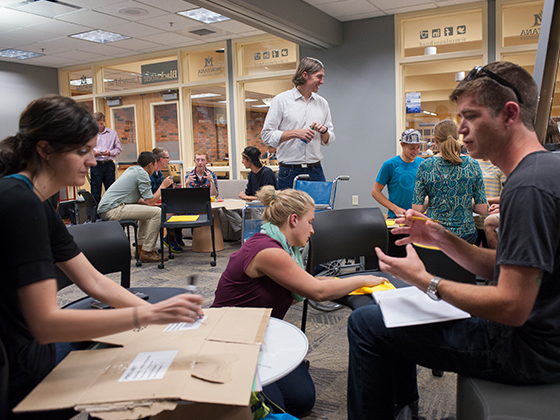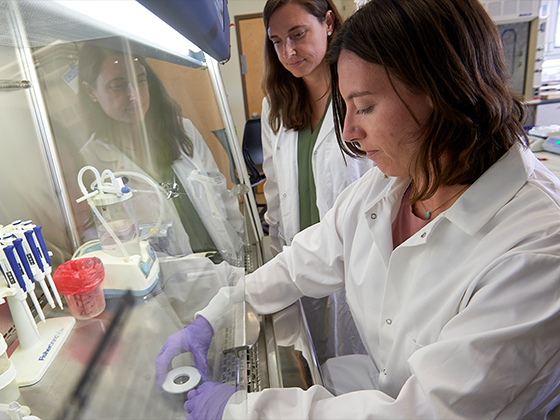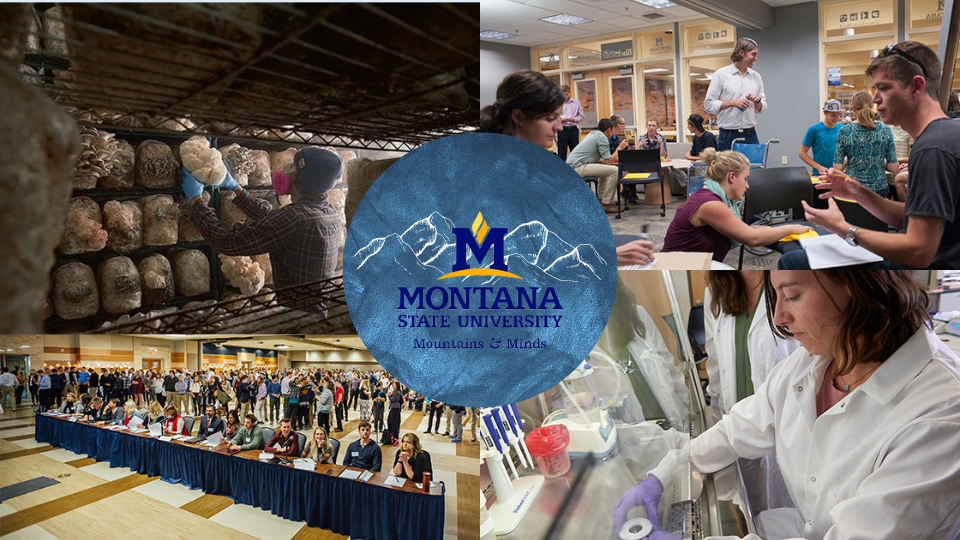Advancing entrepreneurship
| October 24, 2022
As a Montana State University doctoral student in microbiology in 2019, Ben Deuling was teaching a class to undergraduates when one of his students told him that he owned and operated a gourmet mushroom farm in Mississippi. Deuling was intrigued, and the two started meeting regularly to discuss the potential for a mushroom farm in Bozeman.
“I knew nothing about business, growing mushrooms, agriculture,” Deuling recalled. “I had no money and didn’t know how to build (a facility). I literally had nothing except my science background.”
The two planned to go into business together, but Deuling’s business partner had to withdraw for health reasons. Deuling thought he would let the business idea go, but he couldn’t quite shake it. For the next year, after spending each day at MSU working toward his Ph.D., Deuling would come home at night and figure out how to grow mushrooms.
“I converted my laundry room into a fully automated mushroom lab,” Deuling recalled. “It felt so exciting and engaging. And I got to put all of my microbiology training to use.
“I had never done something so cool in all my life,” Deuling continued. “I felt incredibly drawn to this.”

Deuling decided to pursue his business, and, in fall 2020, he launched SporeAttic, a commercial gourmet mushroom farm that sells a variety of specialty mushrooms. The business now sells its products to more than a dozen restaurants in the Gallatin Valley as well as to consumers at farmers markets, grocery stores and online. Deuling said the business currently employs six people and produces between 300 and 500 pounds of mushrooms per week.
Deuling’s successes — and the successes of many other entrepreneurs like him from MSU — have been aided by a growing entrepreneurial ecosystem at the university that provides a variety of resources to MSU students, faculty and recent alumni. Those resources include academic offerings, support from the MSU Blackstone LaunchPad, opportunities to participate in — and earn startup funds from — entrepreneurial competitions, mentoring, networking, access to accelerator programs and microgrant funding, help commercializing MSU innovations through the university’s Technology Transfer Office and more.
“This campus provides a number of different opportunities for students, alumni and faculty who are interested in pursuing their ideas or their dreams,” said Dan Miller, dean of the Jake Jabs College of Business and Entrepreneurship. “The strength of this campus is our interdisciplinary, collaborative nature, which drives innovation and really makes Montana State University stand out.”
Deuling, who ultimately left his Ph.D. program but holds a master’s degree in microbiology from MSU, said that the MSU Blackstone LaunchPad, in particular, was helpful to him. The LaunchPad is an on-campus resource for students, recent alumni and faculty who are interested in business and entrepreneurship. It works with both established businesses and fledgling entrepreneurs to bring new ideas to life and grow businesses.
Trevor Huffmaster, the LaunchPad’s director, emphasized that the LaunchPad, which is centrally located in MSU’s Strand Union Building, is for entrepreneurs at all stages of idea development, and he said it’s common for people to come in without knowing what they may need. The LaunchPad’s focus is coaching and mentoring, Huffmaster added.

“People initially can be intimidated and wonder if they need to have an idea further developed before coming in,” Huffmaster said. “We want everyone to know that we are happy to meet them wherever they are. We start the process with a meeting where we find out what they’re working on and then share all of the resources available, from competitions to general coaching. We’re just walking them through that process.” To date, Huffmaster added, more than 1,500 students have participated in LaunchPad programs, and LaunchPad staff members have hosted more than 2,500 coaching meetings.
For Deuling, the LaunchPad has been central to his success. He noted that he walked into the LaunchPad in the fall of 2019 with no appointment and only a vague idea that the office could help him. But Huffmaster was welcoming and excited to hear about his business idea, Deuling said, and by the end of the meeting, Deuling learned that he had already taken three out of five steps toward starting a successful business.
He also learned that there was an idea pitch competition rapidly approaching, with the opportunity for the winners to earn startup funds. Applications for the competition were due the next day, but Huffmaster encouraged Deuling to put something together despite the short time frame.
It ended up being worth it: Deuling and another student with whom he was working, Ali Moxley, were selected to participate in MSU’s inaugural Big Idea Challenge, and the duo ended up taking first place and earning $1,500 in prize money for their SporeAttic pitch.
“That was big validation,” Deuling said. “For the judges to pick us as the winner, it felt like, ‘Holy cow, we actually have something here.’”
Through the Blackstone LaunchPad, Deuling also learned about a Growth Through Agriculture grant available from the Montana Department of Agriculture. SporeAttic applied and received $11,000 to help get the business off the ground. He also went on to participate in two more venture competitions, the John Ruffatto Business Startup Challenge in Missoula in 2020, where the business placed second and won a total of $10,750 in award money, and the 2021 MSU $50K Venture Competition, where it earned $6,000 for its second-place finish.
Like SporeAttic, other startups have been strengthened by an environment at MSU that supports entrepreneurship and entrepreneurs.
Then MSU students Vanessa Bakken Williamson (who graduated in 2017 with a degree in business marketing) and Vanessa Walsten (who studied sustainable food and bioenergy systems and graduated in 2018) turned a class project into a business that helps prevent food waste. In 2016, the two were enrolled in an interdisciplinary farm-to-market class. As partners for the class’s final project, Williamson and Walsten were paired with a local organic farmer and tasked with creating a product for his farm that added value to the farm’s existing offerings.
The farmer told them that one problem was that vegetables from his farm that were considered “ugly” weren’t selling. That resulted in lost revenue and unnecessary food waste.
“We wanted to help solve this problem and give the ugly vegetables a longer shelf life,” Williamson said.
Their solution was to ferment the farm’s disfigured and excess vegetables. Fermentation — a metabolic process that converts sugar to acids, gases or alcohol — helps preserve food and adds beneficial bacteria.
Walsten and Williamson’s final class presentation was so well received by their professors and peers that they decided to compete in a statewide startup challenge held each spring. There, they received three awards and earned $5,500, which they used to launch their company.

That was about five years ago. Now, the duo’s business, Farmented Foods, offers four products – radish kimchi, spicy carrot chips, dill sauerkraut and a probiotic sipping tonic – that are sold in approximately 30 locations across Montana, Wyoming and North Dakota, including in stores and at restaurants in Billings, Bozeman, Butte, Dillon, Helena, Kalispell, Livingston, Missoula and Whitefish, as well as online and at farmers markets. Their products are also served in MSU’s dining halls through the university’s Farm to Campus program. The pair partners with a growing network of farmers to source vegetables for their products, and they estimate that they’ve saved more than 20,000 pounds of produce from going to waste.
The duo credits MSU resources and support for playing a major role in helping them launch a successful business.
“We couldn’t have done this without the Blackstone LaunchPad, especially since we were still in college and had little experience with starting a business,” Walsten said. “The MSU community was also very supportive, from professors to fellow students. We felt starting a business during college was a great opportunity.”
Another entrepreneur, Zariah Tolman, was an MSU undergraduate student when she started Positivity Outward, a nonprofit to empower youth through mentorship for success and well-being. Tolman graduated from MSU in spring 2020 with degrees in neuroscience and biochemistry, along with minors in biomedical engineering and global health. Then, in spring 2022, she earned a master’s degree in innovation and management from MSU’s Jake Jabs College of Business and Entrepreneurship. She’s now pursuing a doctorate in developmental psychology at the University of California, Riverside.
An app that Tolman’s organization created connects motivated youth ages 13 to 21, including rural middle and high school students, to mentors who guide reflection and action in topics like mental health, self-discovery, and college and career preparation. The students choose the mentors and the topics they want help with to develop confidence, self-awareness and self-management skills. The organization currently has mentors in three countries and 14 U.S. states, and it is scheduled to launch with 75 mentors and 150 participants this fall.
In 2021, Positivity Outward took third place in the social venture category of MSU’s $50K Venture Competition, which came with $4,000 in prize money. And in 2022, the nonprofit took second place — and $7,500 — in the annual John Ruffatto Business Startup Challenge, which is hosted by the University of Montana and open to all students attending a college or university in Montana. In addition to receiving funds from both competitions, as well as valuable support from the Blackstone LaunchPad, Tolman said completing MSU’s Master of Science in innovation and management was particularly helpful with Positivity Outward.
“I learned so much from the program about business, leadership, teams and strategy that I was able to directly apply to Positivity Outward,” Tolman said. “Since the classes are very project-based, I was able to have Positivity Outward be my project for almost all of my classes the second semester. This program provided clarity to Positivity Outward’s long-term goals, moved us forward rapidly but sustainably and built my entrepreneurial toolkit that I will use for the ventures I create after Positivity Outward.”
Faculty members also take advantage of entrepreneurial opportunities available through MSU. For example, a Bozeman-based technology company co-founded by Anja Kunze, associate professor in MSU’s electrical and computer engineering department, has received support from the Blackstone LaunchPad as well as assistance filing a provisional patent from MSU’s Technology Transfer Office and gap funding from that same office. Called NanoMagnetic Solutions, the company develops advanced tools that use magnetic forces for gene editing purposes. The technology could one day lead to more effective treatments for Alzheimer’s disease and other degenerative brain conditions.
NanoMagnetic Solutions also earned a second-place award in MSU’s inaugural $50K Venture Competition in 2020. Then, in 2021, NanoMagnetic Solutions was selected to participate in a 50-hour intensive training program, known as a hyperaccelerator, that is supported by dozens of successful entrepreneurs serving as mentors.
The free program is offered by Early Stage Montana, a nonprofit that works with a broad group of organizations and corporations across the state — including MSU’s Blackstone LaunchPad and its 406 Labs business accelerator — to foster the creation and growth of tech business in the state. As part of the program, selected startups work with mentors on everything from product strategy and sales plans to financial planning and fundraising strategies. The program is intended to help entrepreneurs sharpen their business plans so they can get their products and services to a wider market, faster.

Kunze said that MSU’s entrepreneurial culture and programs have been invaluable to NanoMagnetic Solutions. The idea for the company came from an undergraduate student’s capstone project, she noted, and the LaunchPad put forth a “tremendous” effort to help them turn it into a business.
“Working with the LaunchPad, we went back to the drawing board and developed a research tool into a real product,” she said. Further down the road, Kunze added, the LaunchPad provided other assistance, such as connecting the business with designers for its webpage and connecting Kunze to mentors in the community.
“The entire entrepreneurship world here is just tremendously helpful,” Kunze said.
Huffmaster noted there are numerous other examples of startups from MSU students, faculty and alumni, ranging from an app designed to make it easier to hire students for one-time jobs to a company that provides tools to modernize how firefighting organizations communicate and distribute information to another company that specializes in farming microalgae to make an environmentally friendly, carbon-negative plant fertilizer.
Those startups represent ideas at various stages of development and success, but as a whole, there’s no question that the entrepreneurial ecosystem at MSU is thriving, Huffmaster said.
Attesting to that is the performance of MSU students at the 33rd John Ruffatto Business Startup Challenge in April. There, competing teams pitched their best business ideas to several panels of judges for a share of awards and funding. MSU students with a wide variety of majors across multiple colleges swept the top awards. In all, MSU student teams received $42,500 out of $50,000 in available prize money. Miller, the business college dean, said at the time that the students’ professionalism, preparation and competence shone through.
Whether they are students, faculty or alumni, helping members of the MSU community turn their ideas into successful businesses is something that benefits not just the university but the state of Montana and beyond. When entrepreneurs find innovative ways to solve problems and offer new products and services, they, in turn, generate new companies and jobs.
“These innovative ideas really feed Montana economic development,” Miller said.
Still, the real goal is to help develop leaders with entrepreneurial skills, Huffmaster said.
“Probably the biggest result of (the entrepreneurial support structure we provide at MSU) is that we are a piece of the engine that is training these students to be the best they can be, both now and in the future,” Huffmaster said. “Our product is the student and what they’re going to do with what they’ve experienced and learned. That’s our biggest impact.”
Miller agreed.
“The ideas themselves are important, but it’s really the people that are the most important,” he said. “We’re in the people business here.”
Please credit MSU Mountains and Minds magazine.
High-Resolution Images

